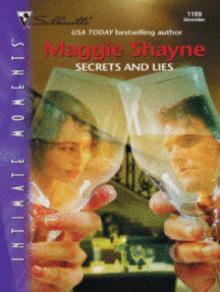- Home
- Maggie Shayne
The Bliss Book Page 4
The Bliss Book Read online
Page 4
Men are Different than Women
According to an article by Tanya Lewis in Live Science:
The research…found that male brains had more connections within hemispheres, whereas female brains were more connected between hemispheres. The results, which apply to the population as a whole and not individuals, suggest that male brains may be optimized for motor skills, and female brains may be optimized for combining analytical and intuitive thinking. [3]
Over the years I’ve learned that when we expect our partners to know what we want, we’re not playing fairly. When we want something from our partners, we need to just say so. Don’t hint, don’t wait and hope, just communicate.
And don’t assume that if s/he loved you, s/he would do x, y, or z.
Here’s the thing. If you believe he loves you, he does.
We create the way people treat us as much as we create everything else in our lives. We can bring out the best in others, or we can bring out the worst in them, and the shorthand answer for how to know which we’re going to get is to ask ourselves which we expect from them.
I hasten to add, we cannot control the behavior of others. Some people are dishonest and nasty. But what we can control is the kind of person we attract to us, the kind of person we accept in our lives, and the kind of behavior we’re willing to tolerate.
And it’s true that people change. We might grow in a different direction than our partner does. They might do the same. Remember that bit about autonomy? If our vibrations mesh for a while, but then they change and become discordant, there are really only three ways it can go.
If our partner’s vibration is lower than ours, we can lower ours to match it. Sometimes this happens without us even being aware of it. I do not recommend this solution, and most people will only know this is the case when they break free. It can feel like releasing an anchor and bobbing straight to the surface.
If our vibration is lower than our partner’s, we can raise our vibration to match theirs again. This kind of partnership is what author Gary Zukav calls a spiritual partnership. Each partner notices when the other is struggling, and holds out a hand to help them find balance once more. This is a very empowering option.
The third option is that two vibrations simply can’t harmonize, and so remaining together brings only misery, and parting ways becomes the only solution. And while sad, when this is the case, letting go is an immense relief to both partners. Some might take longer to see it that way, but eventually their lives will be vastly improved.
Important Note
Violence is an exception. Any person who ever raises a hand to you has failed the test, and your only job in that case is to walk away and never look back. Period. Done.
And then adjust your emotional radio dial so that you are emitting a strong, empowered beautiful, happy signal, that will attract strong, beautiful, happy people to you.
We must not give in to the temptation to continue to live within the story of abuse. While sharing the experience can be empowering, and can help warn others away from an abuser, telling the story from a place of empowerment is a different energy than being trapped in the awful memory.
According to Dr. David Hamilton:
The stress response evolved in humans to give us the ability to fight or flee when faced with danger. Chemicals including cortisol and adrenaline help kick start the body, pushing blood towards the major muscles to give you strength.
But the exact same stress response kicks in when you imagine danger, also producing cortisol and adrenaline and pushing blood around the body. The same chemistry is produced regardless of whether the danger is real or imagined.
What does all this mean in real life? It means that what you imagine to be happening is actually happening as far as your brain is concerned. [4]
Now as we’ve already learned, what we’re focused on and what we’re feeling helps to adjust our frequency. So if we’re feeling the same things we felt during the past trauma, as can happen each time we tell the story, we can keep ourselves stuck on that station.
Instead if we have to dredge it up at all, we should talk about it from a place of empowerment, a place of strength and of triumph and of being a beacon to others who come after. Any time it starts to pull us down—and we’ll always know when it does, we’ll feel it—we have to let it go and focus on the good in our lives now.
Back on Topic:
Focus on the Things You Love About Your Partner
Esther Hicks has often written that our spouse could have ten great qualities and one bad habit, and we could focus on the one bad thing until the relationship ends. On the other hand, our partner could have ten terrible qualities and one good, and we could focus on the single good quality enough to save our relationship. This is because the other person will usually give us more of what we focus on and less of what we don’t.
As in all cases, what we focus on grows. It’s a little trickier with other people, being that they are here for their own pleasure, not ours, but this works more often than not.
The approach of focusing on the good in the other person works in far more relationships than just romantic ones. This habit can work with our boss and colleagues at work, our friends, our siblings, our parents, and our children. Just try to find something really good about them, and come back to that over and over.
And say so. Offer praise and compliments about their goodness, instead of complaints about their badness, and just watch them rise up to match that praise. Flowers turn their faces toward the sun. People will often blossom to your expectations of them.
We have to remember that our Higher Self doesn’t see their flaws. And so when we do, we are at odds with our Source. That causes us pain. It’s not what the other person is doing that’s hurting us, it’s us pulling away from our Soul by seeing things differently. It’s like having a Facebook war with our own Higher Power. That hurts.
Another powerful key, and a hard habit to master, is working toward the goal of ending judgement about what’s good or bad about the other person’s actions, choices and decisions. We must accept that they have their own connection to their Higher Self.
No life is wasted. The addict who never breaks his habit and dies young has had as valuable an experience here on Planet Earth as the Saint who fed the hungry. Both paths expanded the Whole of who we are through their experience.
That’s not to say we don’t try to help someone when we see them in trouble. Of course we try to help. Just as we’d push a child out of the path of a speeding truck, we’ll do everything we can to help a loved one in this situation. But we can’t force them to get aligned or to allow their natural well-being in. We can’t force them to break their addiction. We can show them. We can love them. We can talk to them. We can hope and expect and nudge them toward the very best version of themselves.
But we can’t live their lives for them, and we can’t decide to get well for them either. It’s important that we know, though, that they’re going to be okay, big picture. Even the addict who spends a lifetime in misery will eventually reunite with her Higher Self and realize how unnecessary all that suffering was. She’ll realize she could have reconnected while still physical, and allowed the unhappy times to spur new growth instead. But no matter, her bliss flows on the other side, and all is well. And her life was not wasted.
There is so much pain for families who lose loved ones to addiction, and a lot of that pain is from feeling that they wasted their life, and that they died before their time. I just want to share what I feel in my heart. No life is wasted, and no one dies before their time. This isn’t random. Our lives mean something. And our deaths do, too.
Hard times come to spur growth into better times. They are not meant to be our state for life. But sooner or later, everyone grows from their pain, either here, or there. Either on this side or the other.
When we look at others, especially those we love, we should try to develop the habit of seeing them through our Source’s eyes, as perfect, just as t
hey are, as walking the path that they came here to walk, and growing from the experience, and following their own inner guidance. If we see them with worry and dread, we can’t help them, and bonus, we risk our own alignment. And when we’re not aligned, we can’t help anyone. Not even ourselves.
Maybe we can learn that we are in no position to judge the value of their lives, because we can’t see the Whole picture. We can only see from our own limited human perspective. It’s like looking at a stained-glass window with our noses pressed right to the glass. When we leave these bodies, then we’ll get a much broader view, and a beautiful pattern will emerge. We’ll see in that pattern that every single piece, even the one we thought was ugly, was essential to the whole.
We can get a taste of that broader perspective while we’re still here, if we meditate regularly. But that’s for another chapter.
* * *
Assignment 4
Bliss Up Your Relationships
* * *
Every time you feel irritated with another person in your life, find ten things you love (or even like) about them. Write them down in your journal, and at some point during the day, tell the other person at least one of them. Repeat this every day for 10 days.
You will soon begin to see a different side of them emerging, a side you couldn’t see before. It was there all along, but you were focused elsewhere, so it was invisible to you.
The Goddess Speaks
Look at your lover. Look at him and quiet your mind. Feel your Higher Self, your Spirit, your inner Goddess—feel ME—looking at him through your eyes. Feel me delighting in the beauty of him. In that bend in his eyebrow, in that dimple when he smiles, in that goofy sense of humor, in that awkwardness he sometimes feels. Let me relish the spirit that fills him. Let me bask in the man that he is.
I see no flaw in your love. I see no flaw in any of you. I see you as you truly are, and your inner self, your Higher Self, has no flaw. You are perfect and so is your beloved. And I adore you both.
* * *
Chapter Five
Replacing the Habit of Worry
* * *
According to Web MD, stress can cause:
Mental health problems such as depression, anxiety, and personality disorders
Cardiovascular disease, including heart disease, high blood pressure, abnormal heart rhythms, heart attacks, and stroke
Obesity and other eating disorders
Menstrual problems
Sexual dysfunction, such as impotence and premature ejaculation in men and loss of sexual desire in both men and women
Skin and hair problems, such as acne, psoriasis, and eczema, and permanent hair loss.
Gastrointestinal problems, such as GERD, gastritis, ulcerative colitis, and irritable colon
According to me, stress can cause anything and everything that can possibly go wrong with the human body. Everything.
So when we’re telling ourselves things like, “I’m just a worrier. That’s who I am. There’s no point fighting it,” we should try substituting the words “chain smoker” for “worrier." Say it again that way and see how it sounds. And then understand that chronic worrying is just as harmful as smoking. Possibly even more harmful.
So now that we know why we need to reduce stress and worry, the important thing to figure out is how.
It’s Not Your Fault
I feel like I should go back and begin each chapter in the book with that heading. It’s not your fault. Nothing in your life up until now is your fault. We live our lives the way we’re taught to live. We imitate our parents, our schoolmates, our neighbors, our heroes. And most of the people we’ve grown up learning from were just imitating their parents and friends and heroes, and so on.
Bit by bit, we as a species, gave up being present in the moment, and began instead this existence where we are almost never in the moment. We are never present in the here and now. We’re always either in the past or in the future. We’re replaying what happened in the past, and wishing we’d handled it differently. We’re anticipating what might happen in the future, and wrestling with how we’ll deal with it if it does. We’re never just here and now, in the present.
When’s the last time you actually took a shower? I mean, if you really think about it, we might be in the shower, but our minds aren’t. Our minds are already ten steps ahead of us, on our to-do list for the day. One day, in the shower, I just stopped the speeding train of my thoughts, and actually closed my eyes and turned my face up to the warm water cascading down on me. And it felt heavenly! The steam filling my lungs. The heat soothing my muscles. The water drenching my skin. The scent of my body wash. The sound of the water flowing. It’s a delicious experience, taking a shower. It’s a chance to bask in pleasure every single morning. What a wonderful way to start our days! And so much better than spending those wonderful moments worrying about what lies ahead or stressing over what’s already gone by.
The past is as gone as if it never existed. It’s gone. And the future isn’t here yet, and might arrive in a million other ways than the one we’re imagining. It, too, does not exist here and now.
All that does exist is the moment. This one. And now this one. And now this one. Each and every instant is our present, our here and now, and it is the only thing that is real. So when we spend all our time in past and future, and none in present, we are letting our lives slip by unlived by us. Unnoticed by us. Un-participated in by us.
We live the only way we know. We live in a constant state of reacting to the events around us, having no clue that we can actually take a hand in choosing the ones we want, and not the ones we don’t.
We can’t do what we’ve never been shown. Nothing in your life up until now is your fault. You are not to blame for any of it.
But as we peel away our own layers, we’re learning now how to take hold of it all. We’re learning how to partner with the Universe to create the lives we want. We’re learning that we no longer have to live our lives reacting to what is. We can decide how we want to be, and we can create what is, instead.
Start with the Easy Things
Let’s tackle the easy things first. A lot of people spend a lot of time worrying about and stressing over what other people are doing. This is going to be the easiest habit to break, because what other people are doing is:
Not remotely possible for us to control
Really none of our business.
Once we accept that, shifting our focus away from those subjects will be much easier. Because really, if all our worrying won’t change their behavior anyway, what’s the point? And if it’s not our business, then why are we worrying about it anyway?
Remember that each person must have autonomy over her own life. Remember that no experience is truly good or bad. Good and bad are just flawed and inaccurate judgments we make, even though we’re far from qualified to make them.
You risk your life to push a man from the path of a speeding train. You judge your action as good. The next day the man you saved drives drunk and kills seven people. You decide now that saving him was a bad decision instead of a good one.
The truth is, saving him was just saving him. You did what felt right to you in the moment, and that’s all any of us are ever doing. Judgments can change depending on a billion variables we can’t even see. Judgments are just a bad idea. We can only ever judge what is right or wrong for ourselves in any given moment.
Maxine is lying awake nights because her son is probably gay and she disapproves. She’s dreading the day he tells her. She’s sick over the hard life he might end up having, the obstacles he might face, how it will impact the rest of the family, her friends, co-workers, the neighbors. She’s sure he’ll never get into heaven.
Susie’s daughter is marrying someone Susie thinks is all wrong for her. Maybe she can’t see it now, but this guy isn’t the one. He has no direction or ambition. His table manners are awful. He’s in a band, for God’s sake. How is he going to support a family? Susie is terrified that h
er girl will have a miserable life and wind up in divorce court, maybe after having several kids and ending up with no one to help her raise them. Susie feels she must stop this wedding.
Mary’s sister is making what Mary believes is a terrible mistake by blowing all her retirement savings on a giant RV she can’t even drive. She’s going to regret this purchase before she’s owned it a year, and Mary knows from experience how fast the value will drop. She’ll be underwater on the loan, unable to break even if she sells it. It’s a huge mistake, and her sister just won’t listen, no matter how hard Mary tries to explain what a bad decision this is.
Scott’s mom is starting to forget things.
Nancy’s co-worker wears things Nancy doesn’t approve of in the workplace.
Tom’s neighbor just painted his garage purple. Not purple, but purple!
Take a minute here and write down the thing you’re worrying the most about at the moment. If it has to do with anyone else, you’re in luck! There’s been a mix-up. This is not your worry. Please release it to its owner at your earliest convenience. It was delivered to you by mistake.
Here’s the thing. We cannot possibly know what’s best for other people. We do not reside within their bodies or live in their minds. They have a connection to their Higher Selves, same as we do, and if they are aligned with that part of themselves, then everything they do is taking them on the right path for them. And if they are not attuned to that part of themselves, then everything they do will nudge them toward getting aligned. There are no mistakes. There’s just experience, and we don’t get to choose what others experience and what they don’t.

 Prince of Twilight
Prince of Twilight Oklahoma Christmas Blues
Oklahoma Christmas Blues The Littlest Cowboy
The Littlest Cowboy Edge of Twilight
Edge of Twilight Twilight Phantasies
Twilight Phantasies A Brand of Christmas
A Brand of Christmas Before Blue Twilight
Before Blue Twilight Born in Twilight
Born in Twilight The Brands Who Came For Christmas
The Brands Who Came For Christmas Twilight Illusions
Twilight Illusions Twilight Memories
Twilight Memories Run from Twilight
Run from Twilight Baby By Christmas (The McIntyre Men Book 5)
Baby By Christmas (The McIntyre Men Book 5) Twilight Fulfilled
Twilight Fulfilled Twilight Vows
Twilight Vows Girl Blue (A Brown and de Luca Novel Book 7)
Girl Blue (A Brown and de Luca Novel Book 7) Beyond Twilight
Beyond Twilight Bloodline
Bloodline Twilight Guardians
Twilight Guardians Blue Twilight
Blue Twilight Twilight Prophecy
Twilight Prophecy Embrace The Twilight
Embrace The Twilight Twilight Hunger
Twilight Hunger Two Hearts
Two Hearts Night Vision
Night Vision Girl Blue
Girl Blue The Rhiannon Chronicles
The Rhiannon Chronicles Oklahoma Sunshine
Oklahoma Sunshine Three Witches and a Zombie
Three Witches and a Zombie Brown and de Luca Collection, Volume 1
Brown and de Luca Collection, Volume 1 The Bliss Book
The Bliss Book THAT MYSTERIOUS TEXAS BRAND MAN
THAT MYSTERIOUS TEXAS BRAND MAN Sleep With The Lights On
Sleep With The Lights On Everything She Does Is Magic
Everything She Does Is Magic Daughter of the Spellcaster
Daughter of the Spellcaster Oklahoma Moonshine (The McIntyre Men #1)
Oklahoma Moonshine (The McIntyre Men #1) Twilight Vendetta
Twilight Vendetta Fairytale
Fairytale Witch Moon
Witch Moon Eternity: Immortal Witches Book 1 (The Immortal Witches)
Eternity: Immortal Witches Book 1 (The Immortal Witches) Dangerous Lover
Dangerous Lover At Twilight
At Twilight Innocent Prey (A Brown and de Luca Novel)
Innocent Prey (A Brown and de Luca Novel) THE OUTLAW BRIDE
THE OUTLAW BRIDE Vacation With a Vampire & Other Immortals
Vacation With a Vampire & Other Immortals Vacation With a Vampire...and Other Immortals
Vacation With a Vampire...and Other Immortals Eternal Love: The Immortal Witch Series
Eternal Love: The Immortal Witch Series Gingerbread Man
Gingerbread Man Zombies! A Love Story
Zombies! A Love Story![Blue Twilight_[11] Read online](http://i1.bookreadfree.com/i1/03/28/blue_twilight_11_preview.jpg) Blue Twilight_[11]
Blue Twilight_[11] The Baddest Virgin in Texas
The Baddest Virgin in Texas Legacy of the Witch
Legacy of the Witch THE HOMECOMING
THE HOMECOMING Lone Star Lonely
Lone Star Lonely Reckless Angel
Reckless Angel Thicker Than Water
Thicker Than Water Born in Twilight: Twilight Vows
Born in Twilight: Twilight Vows Secrets and Lies
Secrets and Lies Million Dollar Marriage
Million Dollar Marriage Fairytale (Fairies of Rush)
Fairytale (Fairies of Rush) Weddings From Hell
Weddings From Hell Love Me to Death
Love Me to Death FOREVER ENCHANTED
FOREVER ENCHANTED Mark of the Witch
Mark of the Witch Shine On Oklahoma
Shine On Oklahoma The Bride Wore A Forty-Four
The Bride Wore A Forty-Four THE BADDEST BRIDE IN TEXAS
THE BADDEST BRIDE IN TEXAS The Incredible Misadventures of Boo and the Boy Blunder
The Incredible Misadventures of Boo and the Boy Blunder A Husband in Time
A Husband in Time Vacation with a Vampire...and Other Immortals: Vampires in ParadiseImmortal (Harlequin Nocturne)
Vacation with a Vampire...and Other Immortals: Vampires in ParadiseImmortal (Harlequin Nocturne) Kiss Me, Kill Me
Kiss Me, Kill Me Wake to Darkness
Wake to Darkness FORGOTTEN VOWS
FORGOTTEN VOWS ANGEL MEETS THE BADMAN
ANGEL MEETS THE BADMAN Oklahoma Starshine
Oklahoma Starshine Colder Than Ice
Colder Than Ice Hollow
Hollow Sweet Vidalia Brand
Sweet Vidalia Brand Who Do You Love?
Who Do You Love? Blood of the Sorceress
Blood of the Sorceress Texas Homecoming
Texas Homecoming Heart Of Darkness
Heart Of Darkness Maggie Shayne - Badland's Bad Boy
Maggie Shayne - Badland's Bad Boy Miranda's Viking
Miranda's Viking Long Gone Lonesome Blues
Long Gone Lonesome Blues Dream of Danger (A Brown and De Luca Novella)
Dream of Danger (A Brown and De Luca Novella) THE HUSBAND SHE COULDN'T REMEMBER
THE HUSBAND SHE COULDN'T REMEMBER Magic by Moonlight
Magic by Moonlight Darker Than Midnight
Darker Than Midnight Forgotten (Shattered Sisters Book 2)
Forgotten (Shattered Sisters Book 2)